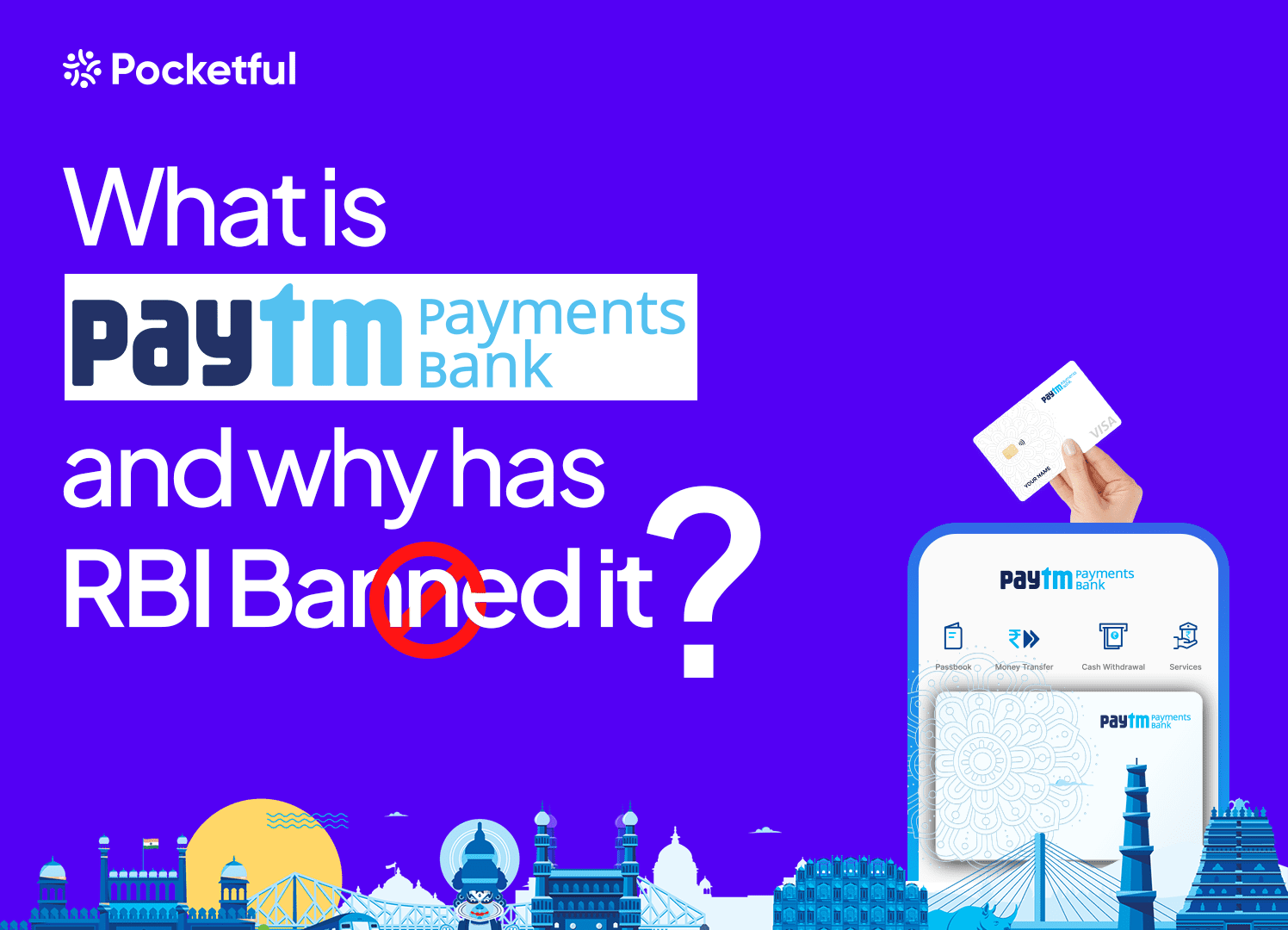| Type | Description | Contributor | Date |
|---|---|---|---|
| Post created | Pocketful Team | Feb-15-24 | |
| Add new links | Nisha | Mar-20-25 |

- Blog
- what exactly happened to paytm payments bank why has the rbi banned it
What exactly happened to Paytm Payments Bank & why has the RBI banned it?

If your go-to option for UPI payments is Paytm, then today’s blog is for you.
PPBL, Paytm Payments Bank, once a rising star in India’s digital payment space, finds itself amidst a controversy. Though not completely banned, the RBI imposed crippling restrictions on its business operations and sent shockwaves to the entire fintech industry.
Paytm Payments Bank Overview
Paytm Payments Bank is an Indian payments bank founded in 2017 and is headquartered in Noida. PPB is a scheduled bank that offers a wide range of services, including issuing credit cards and offering loans. However, Paytm Payments Banks does not offer full-fledged banking services.
Paytm Payments Bank Limited (PPBL) is an associate and an independently operated subsidiary of One 97 Communications, which also owns Paytm. The Company holds 49% of the paid-up share capital of PPBL.
PPBL offers services such as Savings accounts, current accounts, fixed deposits, UPI, Fastag, IMPS, NEFT, RTGS, and net banking. It also provides several benefits to the consumers, including no minimum balance requirement, all free digital transactions, 2% interest per annum on savings accounts and up to 7.50% interest per annum on fixed deposits.
PPBL only invests the deposits in government bonds and does not convert deposits into risky assets.

RBI’s ban
On January 31, 2024, RBI imposed many crippling restrictions on the bank’s operations due to non-compliance with regulations and supervisory concerns.
Below-mentioned is the stepwise breakdown of what happened:
- The RBI issued a notice directing PPBL to suspend onboarding new customers, stop offering cash-back incentives for transfers from wallets to bank accounts and restrict other essential services like bill payments and transfers.
- This action was followed by an external audit report that highlighted persistent non-compliance issues and sustained concerns about the bank’s operations.
- The report flagged that the accounts at the bank were created without proper identification, and there were irregularities in implementing KYC (Know Your Customer) norms, which made the business vulnerable to misuse.
- Some reports also suggested concerns about questionable transactions between PPBL and the Paytm Wallet, which raised red flags about money laundering.
- The RBI had previously also issued warnings and penalties to PPBL for non-compliance, denoting repetitive issues.
- In March 2022, RBI barred Paytm Bank from onboarding new customers and mandated thorough audits of the technical system.
- RBI has also imposed restrictions on the lending arm of Paytm’s Payment Bank, including suspension of deposits, fund transfers, credit transactions, and pauses in operation such as wallets, Fastags, and National Common Mobility Cards.
Impact of RBI’s action
- As a result of the same, after February 29, 2024, PPBL’s existing customers can continue to use their accounts, but for limited services like withdrawalbs from existing balances. Furthermore, PPBL will not accept deposits or top-ups in any customer account, including wallets and Fastags, post 29th February 2024. The restrictions will impact Paytm’s overall business model because PPBL was a key partner in offering financial services.
- The news also affected Paytm’s stock prices significantly, which crashed almost 40% in two days..
- The restrictions by the RBI are expected to significantly impact PPBL’s profitability as many income-generating services will now be suspended.
- The action has also raised concerns about PPBL’s compliance practices and corporate governance, significantly damaging its reputation and trust among customers and shareholders.
- While the license has not been revoked, the future of PPBL is still being determined.
- The RBI’s action has also brought increased regulatory scrutiny to Paytm’s entire business ecosystem.
Currently, Paytm is contesting the restrictions and seeking regulatory approvals to resume full operations, and the impact on existing customers and Paytm’s future are still unfolding every day.
Read Also: Paytm Case Study: Business Model and Marketing Strategy
Future of Paytm Payments Bank
Possible routes ahead for Paytm Payments banks can be as follows.
- In the future, successfully sticking to regulatory norms and resolving concerns identified by the RBI will be crucial for PPBL.
- PPBL must obtain necessary approvals from the RBI to lift restrictions and resume full operations.
- The RBI might lift partial restrictions, allowing PPBL to offer some services. Thus alleviating some of the concerns of PPBL.
An uphill war awaits PPBL and only time can tell if it will survive this storm or succumb to its might.

Conclusion
RBI’s action harmed Paytm Payments Bank and Paytm. However, the long-term consequences are still uncovering and it depends on PPBL’s ability to address compliance issues and regain regulatory approval. The situation has highlighted the importance of adhering to regulations and maintaining strong governance practices in the financial sector.
Frequently Asked Questions (FAQs)
What do the restrictions imposed by the RBI mean for existing customers?
Existing customers’ accounts are safe. However, after 29th Feb 2024, they can use their accounts for withdrawals only. Additionally, PPBL cannot onboard new customers.
Why did the RBI restrict PPBL?
The RBI quoted non-compliance with regulations and supervisory concerns without disclosing other details.
Is PPBL completely banned?
No, but restrictions are stringent and severe.
What will happen to my account after 29th Feb, 2024?
You will be able to use your account for withdrawals without any restrictions.
Is my money safe?
Absolutely yes, the RBI’s action does not affect your existing balances in your account or wallet and your money is completely safe and secure.
Disclaimer
The securities, funds, and strategies discussed in this blog are provided for informational purposes only. They do not represent endorsements or recommendations. Investors should conduct their own research and seek professional advice before making any investment decisions.